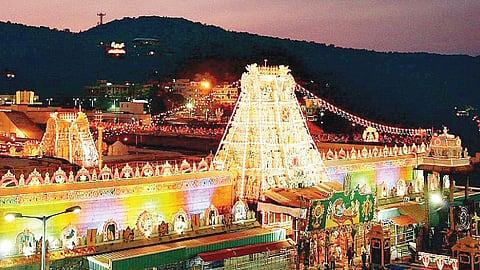TTD’s Divya Kshetrams hit by staff crunch
TIRUMALA: The Tirumala Tirupati Devasthanams (TTD), one of India’s wealthiest temples, faces a severe staff shortage. With over 108 employees retired as of March 31, 2025, and an estimated 500 more expected to retire by June, maintaining existing temples has become challenging.
This shortage poses significant concerns as TTD plans to construct “Divya Kshetrams” (Srivari Temples) in every state.
The lack of essential staff, particularly Archakas trained in Pancharatra and Vaikhanasa Agama, crucial for temple operations, raises questions about the feasibility of the expansion. While TTD is optimistic about simultaneous construction and recruitment, some experts urge the temple board to prioritize addressing the staff crunch over new temple construction.
The staff shortage at TTD has reached a critical point, forcing the organization to rely heavily on local volunteers for sensitive tasks like Hundi counting at outside temples.
A recent incident exposed this vulnerability when a staff member was suspended in March for allegedly manipulating foreign currency denominations in a Hundi, amounting to Rs 6.5 lakh, with an ongoing police investigation.
Experts suggest that the staff member exploited the situation due to being indispensable amid the staff shortage, highlighting the risks of relying on overextended personnel.
Furthermore, TTD has been slow to develop a comprehensive manpower deployment and recruitment strategy, particularly for crucial roles such as Archakas trained in Pancharatra and Vaikhanasa Agama, Veda Parayanadars, Paricharakas, temple kitchen (Potu) staff, and sanitation, security, and musical staff.
TTD is grappling with a significant staff shortage, with 108 employees retired as of March 31, 2025, and an estimated 500 more expected to retire by June. The lack of new recruits has impacted not only temples but also guest houses, Public Amenities Complexes, and other support facilities.
Notably, the TTD’s staff strength has dwindled from 16,600 employees two decades ago to around 5,000 currently.
The temples taken over from the AP Endowments Department, such as those in Vontimitta, Devuni Kadapa, and Valmikipuram, are facing a severe resource crunch, relying heavily on TTD funding and facing periodic pressure for increased allocation.
Unclear path ahead for Divya Kshetrams
Moreover, TTD temples in Jammu, Rishikesh, Kurukshetra, and Delhi are struggling with a shortage of Archakas, raising concerns about expanding to foreign lands due to traditional restrictions like those imposed by the Vaikhanasa Agama, which prohibit temple priests from crossing oceans.
The Divya Kshethrams initiative was first formally announced in 2015 with letters sent to several state governments, proposing the construction of Lord Venkateswara temples. Constructions were completed in a few locations such as Kurukshetra, New Delhi, Kanyakumari, Chennai, Rampachodavaram and Seethampeta, but many of them continue to operate with insufficient staff. TTD had previously expanded into major urban centres such as Chennai, Hyderabad, Bengaluru, and New Delhi to improve access to darshan tickets, accommodation, and spiritual outreach.
However, many of these information centres have either shut down due to the rise of online services or have been converted into small temples or Kalyana Mandapams.
An example is the Chennai information centre, which also has a Dhyanamandir. The Chennai centre has never been officially designated as a temple, but the locals treat it as one. It has become one of the top revenue-generating sub-temples via Hundi collections, despite running with a skeletal staff.
Meanwhile, letters have been sent to Chief Ministers and administrators of 18 states and Union Territories, including Uttar Pradesh, Bihar, Rajasthan, Kerala, Goa, and Sikkim. Chief Ministers of several states have responded positively to TTD Trust Board Chairman BR Naidu’s request for land allocation to build temples in their respective capitals.
Chief Minister Nara Chandrababu Naidu is also said to have discussed this matter during a recent review with the board. However, according to a senior TTD officer, a clear financial and administrative policy is still pending. Key questions remain: Who will bear construction costs? How are donor roles defined? And what are the operational obligations once a temple is established? In case of Navi Mumbai, an MoU exists with a private donor, but most proposed locations have no such clarity.
Legal, administrative and cultural hurdles
Legally, TTD is governed by the TTD Act, which has limited clarity or flexibility when it comes to constructing temples outside AP or India. Amendments may be necessary if the institution is to continue its out-of-state or international expansion. Further, while TTD is registered under the Foreign Contribution Regulation Act (FCRA), approval from the Union Ministry of Home Affairs is essential for each project and is only valid for five years.
With political leadership changes in those states, continuity may not be guaranteed.

